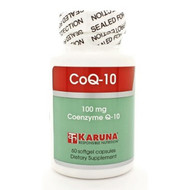CoQ10 and Statins
Posted by DS DC on Jul 28th 2022
CoQ-10 and Statins
Statins Are Big Business
When the government was tracking statin use last decade, about 50% of men and 35% of women in the US population between the ages of 65 and 74 were users. Even in the 46-64 age group, about 1 in 5 men and women were taking a statin. Data hasn’t been gathered this religiously lately but I see no reason to think that statin use is down. I would imagine that just about every adult in the US knows the names Lipitor and Crestor. What is easier than taking a pill to beat heart disease? One of these magic pills per day and poof, heart disease is just a memory, right? The data isn’t quite that clear that statin use has reduced deaths from heart disease. Some studies say they do the job and other studies seem to indicate that other factors are just as or more important.
Who is a Statin Candidate?
Should you be taking a statin? Some independent researchers and medical associations think that certain people should consider drug therapy. This include: People who already have cardiovascular disease that is those that have had heart attacks, strokes caused by blockages in a blood vessel, mini-strokes (transient ischemic attacks), peripheral artery disease, prior surgery to open or replace coronary arteries, LDL levels of 190 mg/dL or higher, have diabetes and an LDL of 70 or above and anyone else with a family history of heart disease especially with an onset before 55 in men or 65 in women and have other risk factors along with an LDL above 100.
Other risk factors include: smoking, low exercise, high blood pressure, obesity, poor stress management.
What Can Go Wrong?
Let’s say you have several of these risk factors and decide that one these statins is the right approach. You get plenty of propaganda about the benefits of statins so let’s talk about some of the negative effects.
The most important negative effects are muscle soreness and memory loss along with difficulty sleeping and headaches. Of course sleeping problems will contribute to memory loss.
Some of these negative effects are the result of statins action to lower CoQ10. CoQ10 or coenzyme Q-10 is made by the body but like many important biochemicals, tends to decline with age. CoQ-10 is used in energy production pathways and is also a powerful anti-oxidant. Less than ideal levels of CoQ10 have been implicated in a long list of health problems including:
- heart disease
- kidney disease
- high blood pressure
- age-related macular degeneration
- chronic fatigue syndrome
- lymphoma
- many cancers including breast, prostate, lung, pancreas, colon kidney
- some cancers of the head and neck
- Type II diabetes
- obesity
- Parkinson’s disease
Supplementing with CoQ10 Makes Sense
This makes sense because as mentioned, CoQ10 is part of basic energy pathways and is in particularly high concentrations in organs like the heart, kidneys and liver. Lucky for us, CoQ10 production may be lower in some people due to genetic factors and also due to age factors but it is easily supplemented. People interested in disease prevention would be wise to add increasing amounts of CoQ10 to their supplement regimen as they age.
One of the effects of statins is the interference with CoQ10. The simple solution is to supplement CoQ10 if you are taking a statin. This additional CoQ10 doesn’t appear to interfere with the goal of the statin, that is lowering lipids such as LDL.
This is so simple that it seems negligent to me that a doctor would prescribe a statin without clear instructions to supplement CoQ10.
Watch for That Muscle Soreness and Fuzzy Brain
If you experience even a little bit of muscle soreness or even a tiny bit of cognitive decline with statin use, you are not getting enough CoQ10.
So how much is enough? The doses in the literature runs from 50 to about 6000 mg per day. I am including this link to a CoQ10 Mayo Clinic summary of research recommendations for different conditions. To save a step, if you are taking a statin, a typical dose is 300 mg divided into three 100 mg doses throughout the day. If you also have conditions such as Alzheimer’s, ALS or other serious disease, 300 mg won’t be enough.
Is there a downside to CoQ10 use? It seems to be rare but some have reported stomach upset and diabetics might have to adjust their meds as blood sugar can drop. It can also interact with some medications, including beta-blockers, some antidepressants, and chemotherapy drugs. You might need to change the amount of statins you take if you’re also taking CoQ10. Do a bit of research of any med you are taking to see how it might interact with CoQ10.
You might see some references to idebenone. This is a synthetic CoQ10 developed as a drug for several conditions. No approvals in the US or Europe have been granted to date. It appears that when taken orally only a tiny percentage ever reaches target cells as it is readily altered in the liver. We experimented with this ourselves some years ago for a time but went back to basic CoQ10.
If you are taking a red yeast rice product like CholestGenix, you should also supplement your CoQ10 too.
You can probably find some sources of “cheap” CoQ10 but some random samplings have found that many of these cheaper supplements had virtually none of the active ingredient you were paying for. At OVitaminPro, we won’t offer such bargains as we want you to actually get something out of the supplements you are taking. A couple of brands that we personally use are:
